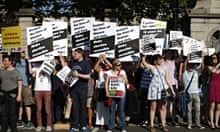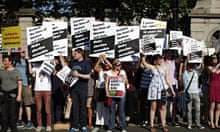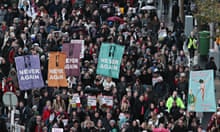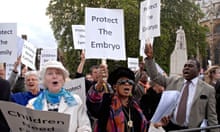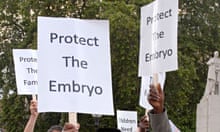I know a woman in her 30s: she’s married, she has a toddler, and she desperately wants a second child – but a dangerous medical condition means that having another baby would be life-threatening. Despite being careful, she got pregnant. She had an abortion because she wasn’t willing to risk her life and leave her child motherless, but she still feels a deep sadness.
I know another woman, in her 20s, who had a shitty boyfriend (but no kids) when her birth control failed and she found herself with a pregnancy she knew she didn’t want – a pregnancy she wasn’t ready for. She was upset about the situation, but had no doubts about what she wanted to do and, after the abortion, no regrets. She rarely thinks about the pregnancy or the abortion anymore.
If you’re like a lot of people, you probably have much more sympathy for the first woman than the second. Though the majority of people in America and Northern Ireland and so many other places believe abortion should be legal, too many of us still think about reproductive rights as if there’s a hierarchy of good and bad abortions – the kind that women “deserve”, and the kind women should be ashamed of.
But those two women? They’re both me.
On Thursday, the 1 in 3 Campaign (a hat tip to the fact that 1 in 3 American women will have an abortion) launched a live-streamed, national abortion speak-out featuring people like Planned Parenthood president Cecile Richards, comedian Lizz Winstead and artist Favianna Rodriguez – and me.
I’ve written about ending my wanted pregnancy and the turmoil I faced with the decision, but I’ve never before spoken publicly about my first abortion – not because I was ashamed, but because it truly didn’t have that tremendous of an impact on my life. If anything, being able to have that abortion made my life better: I was able to publish my first book, meet my now-husband, cultivate the life that I’m living and build the family that I love.
Maybe you think that’s callous. But the truth is that, despite the abortion stories that often dominate the public pro-choice narrative – the wanted pregnancies that must end because of health concerns or severe fetal abnormalities – most people who end their pregnancies do it for the same reason I did that first time in my 20s: Some women just don’t want to be pregnant – and there’s nothing wrong with that.
I don’t owe anyone an explanation over why I had my abortions, but, as the conservative movement continues to strip women of their rights and humanity, I believe that those of us who can speak, should. Because for too many women, the consequences are just not worth it.
For some women who had abortions, speaking out could cost them their jobs, or curtail their relationships with family members. Others don’t want to deal with the inevitable harassment that comes from talking about having an abortion, especially online.
Steph Herold, the deputy director of Sea Change (which is dedicated to ending stigma against abortion and other reproductive experiences) told me that in the group’s research around abortion “storytellers”, people mentioned both receiving encouragement from people in their lives and from strangers. But they also talked about being shamed by people they knew – and those they didn’t – for sharing their abortion stories.
“In fact, when I tweeted about our reports, one woman tweeted back about her reluctance to share her story in public again as a result of being targeted for harassment by anti-abortion organizations,” Herold told me.
It’s time to end what Katha Pollitt calls the “awfulization” of abortion, because it is a normal part of many women’s reproductive lives. Sometimes our stories are mundane and sometimes they’re tragic, but they’re always ours. And even if some of us do choose to share them to combat the stigma against all of us who have abortions, there’s really no explanation necessary.
Comments on this article are pre-moderated and must be approved by a moderator before appearing on the site


